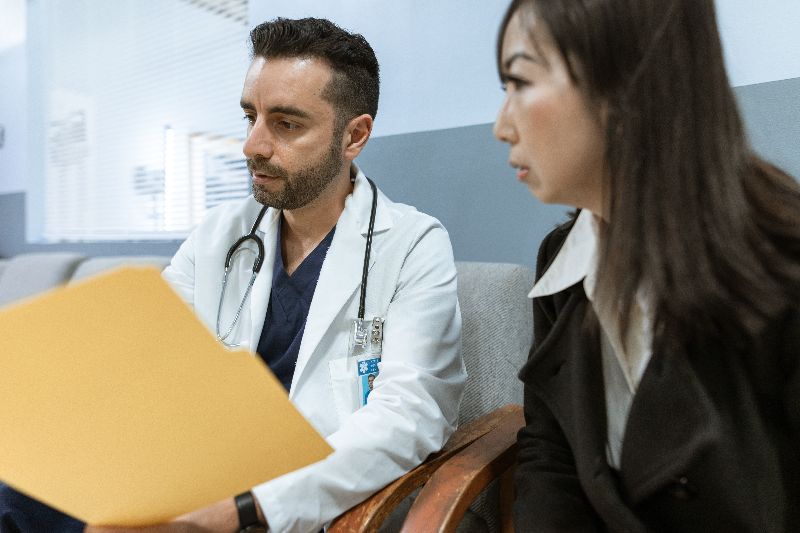Do you also forget important documents or miss out on giving a crucial detail at your doctor’s visit? Maybe the nervousness is causing you to forget, or perhaps you are in a rush to reach on-time at the clinic. Whatever the reason might be, it’s not a good habit. So, here are seven brilliant tips to help you prepare for a doctor’s visit.
How to Make the Most of Your Doctor’s Appointment
1. Make a List of Your Concerns
Preparing for a doctor’s visit can be overwhelming, especially if you have multiple health concerns to discuss. You may feel rushed or forget important details during the appointment. However, making a list of your problems and prioritising them beforehand can help you make the most of your time with the doctor.
- Start by writing down all of your health concerns. Consider which issues are urgent and require immediate attention versus those that can wait until future appointments. This will help you prioritise what to discuss with the doctor during your visit.
- Provide detailed information about each concern on your list. Include when symptoms started, how often they occur, their severity level, and any actions taken to alleviate them. Providing this information upfront can save time during the appointment and give the doctor a clearer understanding of each issue.
2. Complete Medical Record
Compiling a list of your medical records, prescriptions, and information on previous visits to other doctors can help your doctor attain a complete picture of your current health. They can build a proper treatment plan by analysing your existing health condition and focusing on providing better healthcare. It also helps avoid unnecessary tests or treatments.
Further, there’s nothing worse than taking the time out of your work schedule for a doctor’s visit only to be in the middle of the appointment and realise you forgot an important document. Also, there are chances of misplacing important scans or prescriptions when saved in a physical file. A better solution to this problem is having a personal health record app that can digitise your medical records, test results, scans, and other health-related details.
3. Tell the Doctor About Any Latest Life Changes
Let your doctor know everything that has happened since the last time you visited them. This includes any major changes in your appetite, energy levels, or sleep patterns. If you have started taking new medications, inform it without delay. Further, let them know whether you had to face a medical emergency in before the recent visit.
4. Take Notes
A doctor’s visit can be overwhelming as you get to learn new things about your health, and sometimes these things would be new for you to grasp immediately. It can get hard to absorb all of the information, maybe because you’re too tired, anxious, or exhausted. Regardless, it’s always a nice habit to note whatever is important.
Have a digital note ready with you to write down everything essential, like the time and frequency in which you’ll have to take your medications, an explanation of why the symptoms are caused, and why your body is acting the way it is.
5. Updated Insurance Cards
Making most of your doctor’s appointments also includes keeping your insurance cards ready during the visit. This ensures that your treatment and prescriptions are paid for on time, saving you money and time during the doctor’s visit.
6. Pictures of Wounds, Signs of Infection, Concerns
A patient with a serious wound due to a health condition, accident, surgery, or any other concern should regularly take pictures of their healing stages and bring them to the initial and follow-up visits to the doctor. By doing this, the doctor gets an accurate view of your injury and can better understand your wound’s progress in between the follow-up visits.
Further, if you are having flare-ups or allergic reactions, it’s possible that the symptoms won’t stay in your body every time you visit the doctor. Hence, taking pictures of physical signs like hives or swelling can help the doctor understand your medical condition better and give you accurate treatment.
7. Ask Questions
Lastly, this point can’t be stressed enough – ask questions! The time is limited at a doctor’s clinic, but having a clarification about your own body and symptoms is important to take control. Don’t hesitate to ask what certain medical terminology means. The doctor knows you’re not well-versed in medical terms, so there’s no need to be embarrassed.
Be Honest!
In conclusion, it’s always best to be honest with the doctor about your symptoms. There’s no need to be embarrassed or ashamed and leave out crucial information related to your health because doctors have already heard many things you might think would be uncommon. Moreover, honesty will save you from getting misdiagnosed and help you make the most of your doctor’s visit.
Jigar Patel is the Founder of Health-e, a HealthTech app that simplifies health records management along with providing personalized and preventative healthcare solutions. Although he has 20+ years of operations and management experience in the EPC domain, Jigar’s true passion lies in making healthcare simpler, faster and more accessible for doctors and patients alike. He strongly believes that people need to be empowered to participate in their own healthcare and is constantly thinking of ways to build this into his app. He loves to keep things simple be it in life, product design, his work or the content he develops. Being married for 10 years and having 2 kids have taught him that perspective matters, so you can always count on him to share new perspectives on various topics.

